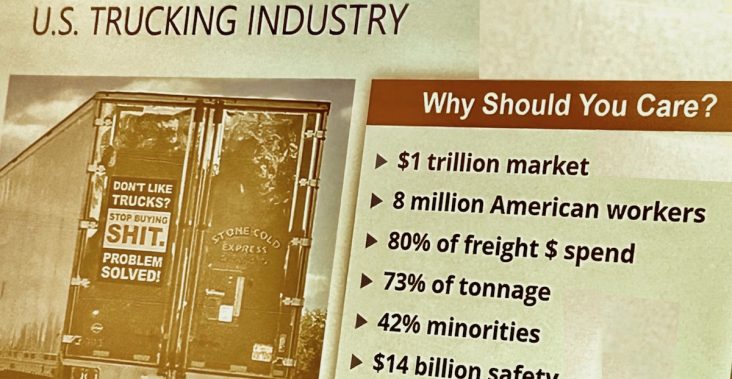Recession, autonomous trucks, litigation topics at truckers conference
by May 9, 2024 7:07 pm 822 views

Trucking is big business in Arkansas, but the freight demand downturn, now in its 15th month, shows no sign of retreat, according to Shannon Newton, president of the Arkansas Trucking Association (ATA).
She said the unprecedented demand for goods from the past few years subsided as more consumers spend on services and experiences. State and national trucking companies added capacity at high costs two to three years ago, putting trucks in service before spending patterns shifted.
Newton said carriers are still riding out the excess capacity across the sector, and that is not likely to improve before 2025, barring no external shocks to the U.S. economy.
Andrew Boyle, chair of the American Trucking Association and co-president of Boyle Transportation, was a keynote speaker on Thursday (May 9) at the ATA’s annual conference in Rogers. Boyle, a Boston native, grew up in the trucking business when his parents started Boyle Transportation, serving largely the pharmaceutical industry. Boyle Transportation was sold to Canadian supply chain management firm Andlauer Healthcare Group in 2021. He and his brother now co-run the operation.
Boyle said he is proud to work in a $1 trillion national industry that employs 8 million workers. He said 80% of the total freight dollars spent annually are in trucking. And even though technology continues to evolve and autonomous vehicles could make up 32% of the fleets in the next 20 years, there will still be a need for drivers, he said.
The organization supports the Truck Parking Safety Improvement Act, which would create a $755 million federal grant program for truck parking expansion. He said it takes one hour a day for truck drivers to find parking.
As the trucking industry battles excess capacity and rising insurance and equipment costs reduce profits, there are also more lawsuits than ever before, thanks to litigation finance. Litigation finance provides capital to claimants, law firms, or companies collateralized solely by the future proceeds of their meritorious cases and legal claims.
Boyle said litigation finance has grown 745% since 2015. In active states like California, 97% of the suits result in the plaintiff’s verdicts. Some states are enacting legislation to block the financed lawsuits.
Boyle also talked about emissions standards and said no one in the U.S. wants to see more pollution. He said emissions had been reduced by 99% since the mid-1980s, and there is still room for improvement, but it doesn’t have to be electric vehicles.
“Where do the electric vehicle advocates think most of the electricity in this country comes from? 60% still comes from fossil fuels,” he said
Boyle advocates for renewable diesel. He said renewable diesel releases one-third of the carbon emissions of a traditional diesel truck over its lifetime, but it’s rarely part of the conversation.
Autonomous vehicles were also discussed during Thursday’s session, with executives from Gatik, Kodiak and Waabi taking part in a panel discussion moderated by Craig Harper, a retired executive from J.B. Hunt Transport. Kodiak and Waabi are involved in long haul routes, and Gatik works with smaller Class 3-7 size trucks on fixed short routes.
While autonomous trucks are coming, they will never replace the majority of truck drivers, according to the executives. The smart technology in driverless trucks is intuitive and gets smarter with time using generative artificial intelligence technology. Each exec reiterated they’ll move only as fast as safety allows.
The smart trucks are equipped with 12 mirrors that can see 360 degrees around the trucks and dozens of smart sensors, which are checked every 100 milliseconds. The driverless trucks will be safer because they can run backup plans for any scenario, but they can not compensate entirely for distracted drivers in non-commercial vehicles.
Michael Wiesinger, vice president of commercialization with Kodiak, said the company is working with several of the largest fleets based in Arkansas. He said when an autonomous truck gets into an accident, a “flight recorder” will be accessible to show every angle of the vehicle.
“We can not say there won’t be accidents, we can only say our trucks did everything possible to avoid them,” Wiesinger said.
